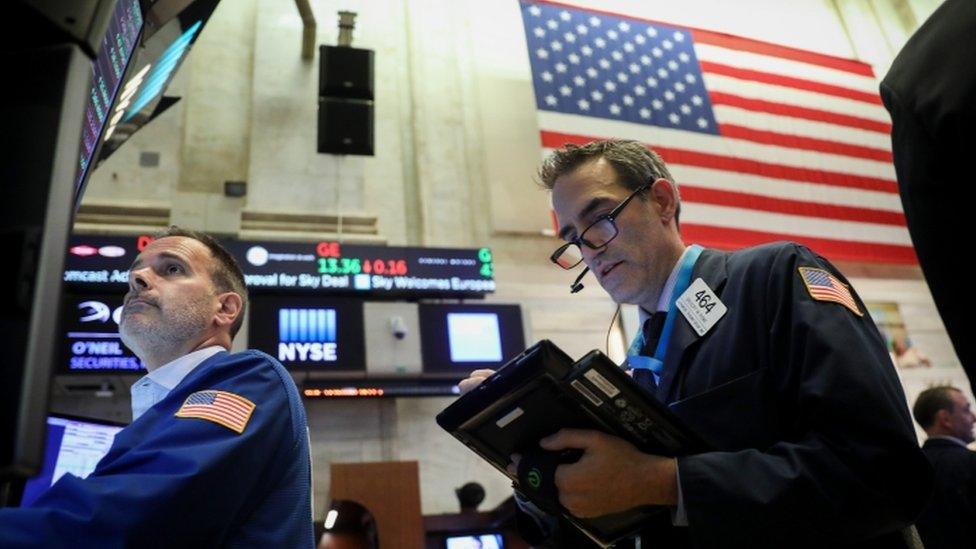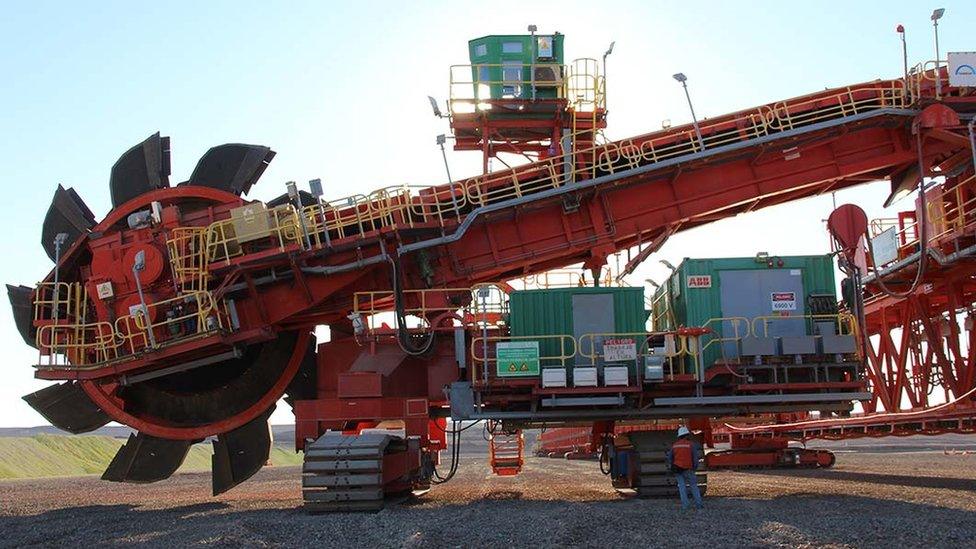Stock markets stabilise after earlier sell-off
- Published
- comments

US markets stabilised on Thursday after steep falls earlier in the day spurred by fears about US-China trade tensions and global growth.
The Dow Jones index closed down about 0.3% while the S&P 500 slipped less than 0.2%.
The tech-focused Nasdaq even ventured into positive territory, ending 0.4% higher.
The rebound followed sharp falls in Europe and extended the sharp market swings seen in recent weeks.
In London the FTSE 100 tumbled 3.2%, or more than 200 points, to close at about 6,700 - its lowest level in two years.
Falls on European markets were even steeper, with Paris and Frankfurt both shedding almost 3.5%.
Oil prices also sank, with Brent crude more than 2% lower.
Analysts said the arrest of Chinese telecoms giant Huawei's chief financial officer in Canada had revived worries over the US's trade war with China.
In Asia, Tokyo's Nikkei index shed 1.9%, while the Hang Seng in Hong Kong fell 2.5%.
On the FTSE 100, worst-hit sectors included miners, oil companies, carmakers and tech stocks, with mining firms Antofagasta and Glencore among the biggest losers.
The concerns about trade tensions, oil prices and slowing growth sparked losses at US financial, energy and materials companies early in the day, sending all three major US indexes more than 2% lower.
But sentiment later swung in the other direction.
Analysts at Oxford Economics said markets had become "overly gloomy".
IMF Managing Director Christine Lagarde also said in a CNBC interview that worries about recession were "a little bit overdone", although uncertainty was causing increased volatility.

Analysis by Michelle Fleury
The US stock market is having another ugly day.
Coming up with culprits for the most recent panic isn't hard.
Investors fear the trade war between China and the US will escalate. They worry America's central bank will raise interest rates too far. And they're concerned about Britain's exit from the European Union. All factors that could hurt company profits.
The tougher question to answer is where the market is headed. Will it keep going down or bounce back?
Many on Wall Street are describing the recent stock turbulence as a market correction - defined as a drop of at least 10% from a recent high.
How long it lasts depends on what investors perceive are the prospects for global economic growth.
And right now the psychology of the markets appears fragile.


Shares in mining companies were among the worst hit
Markets 'spooked'
Oil prices fell on Thursday as traders waited for news from the meeting of Opec oil-producing nations in Vienna, with some member states keen to agree on a production cut to drive up prices.
Members tentatively agreed to cut output but were waiting for a commitment from Russia, which is not in the cartel, before making any firm decisions, according to insiders.
Investors were also reacting to new US trade deficit figures, measuring the difference between imports and exports of goods and services.
That gap increased to $55.5bn in October, the highest level in a decade, as major markets including China, the European Union and Mexico purchased fewer US products.
All three markets have hit US goods with new import duties in retaliation for tariffs imposed by the Trump administration.
Laith Khalaf, senior analyst at Hargreaves Lansdown, said the arrest of Huawei's chief financial officer had "reignited fears that trade reconciliation between the US and China may not be forthcoming any time soon".
"The market is spooked by the damage a continuing trade war could do to global economic prospects, and that's hitting share prices in the UK and overseas. "
- Published6 December 2018

- Published6 December 2018
